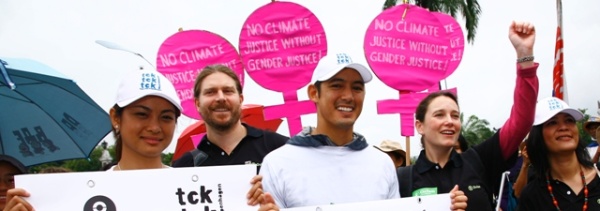[Press release of SDG Watch Europe, 6 June 2016] SDG Watch Europe, an alliance of 70 organisations including the European Environmental Bureau (EEB), Plan International and the European Women’s Lobby (EWL), has today (6 June) written to European Commission President Jean-Claude Juncker calling for him to adopt, as a matter of urgency, an overarching strategy to guide implementation of the 2030 Sustainable Development Agenda.
Leida Rijnhout, Director for Global Policies and Sustainability at the European Environmental Bureau (EEB), said:
“It is time that President Juncker decides on where to go with Europe. He can either choose the sustainable way with a concrete plan to implement the global 2030 Sustainable Development Agenda, or he can stick to the old fashioned growth and jobs mantra. However, the latter will fail to achieve even its stated aims and will only exacerbate the environmental and social problems facing Europe and the rest of the world.”
Agreed in New York in September 2015, the adoption of the 2030 Agenda was a major global achievement and the EU can rightly be proud of the part it played. SDG Watch Europe also welcomed a commitment to implement the Agenda in the 2016 Commission Work Programme, entitled ‘No Time for Business as Usual’.
However, despite these fine words, there has been extremely little progress at EU level and the danger is growing that ‘business as usual’ will prevail. If Europe is to play its part in addressing global challenges, it needs to develop an implementation strategy to guide the work of all the European Commission Directorates-General and the other EU institutions.
Tanya Cox, Senior Policy and Advocacy Manager, Plan International, added:
“We’re concerned that the Commission is moving ahead too slowly on internal policy and action on sustainable development and that the small amount of progress is taking place behind closed doors with no public consultation. It is crucial that the Commission closely involves civil society – and other stakeholders – in the development of an overarching strategy if Europe is to achieve the best results for people and the planet.”
The challenges facing the world, including climate change, inequality between countries and between people in the same country, conflict and migration, are massive and complex and can only be tacked through comprehensive, cross-border solutions. The EU now has the opportunity to show that it is ready, willing and capable of action that is commensurate with this task.
For more information:
Philippa Nuttall Jones, Communications Manager, philippa.jones@eeb.org, 0032 (0) 2289 13 09/0032 (0)4 71 57 01 81
Tanya Cox, Senior Policy and Advocacy Manager, tanya.cox@plan-international.org, 0032 (0)2 504 60 53
Notes to editors:
The key messages from the letter:
Not only does an overarching strategy need to address integration and coherence between the EU’s domestic and external affairs, it also needs to do so across policy areas by finding a means to break down the silos that continue to exist between and within DGs and the sectors they represent. The 2030 Agenda was designed with the objective of addressing the interlinkages and interdependencies that underpin today’s global challenges and therefore calls for a whole-of-government approach which puts the well-being of people and planet at its core, with economic and financial systems to support them.
The EU strategy must also address coherence between national and EU level. Many Member States are well underway with putting in place procedures and plans to implement the 2030 Agenda. However, there will come a point when delay at EU level creates a bottleneck for progress at Member State level. The need for an overarching strategy is particularly acute in areas where the EU has shared competence with the Member States.
SDG Watch Europe therefore calls on President Juncker to set out, as a matter of the greatest urgency, how the EU will respond with clarity and conviction to the challenge of this ambitious, universal Agenda, and to commit to developing an integrated, overarching strategy covering internal and external affairs.
Given the openness of the process to develop the 2030 Agenda, the EU should consult with civil society in drawing up its implementation strategy, as recommended by the European Parliament in its resolution of 12 May. SDG Watch Europe would therefore like to see the launch of a transparent and inclusive public consultation on the implementation of the whole 2030 Agenda.



